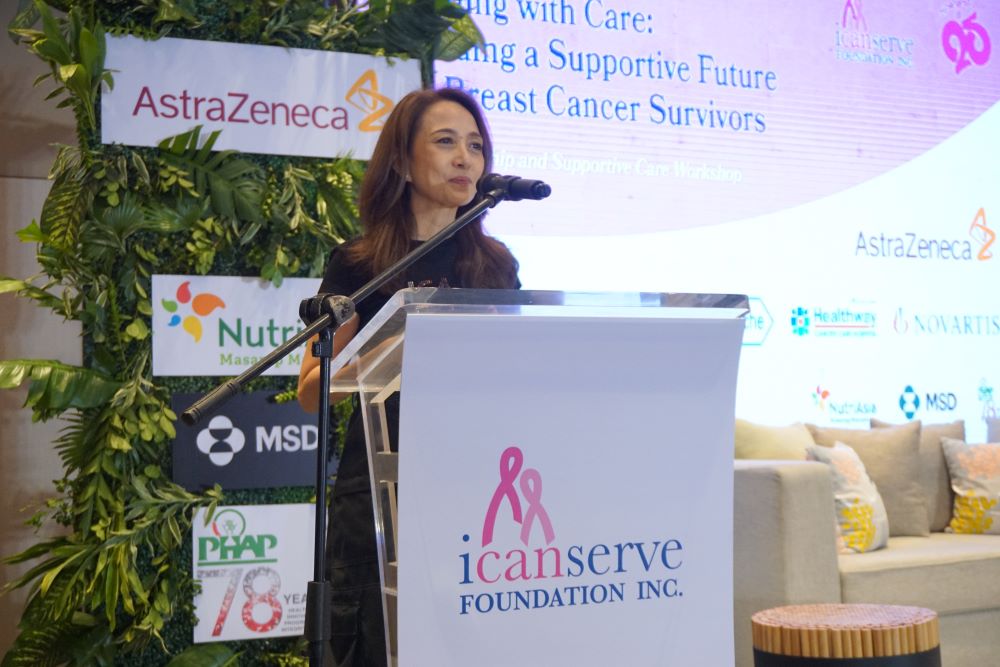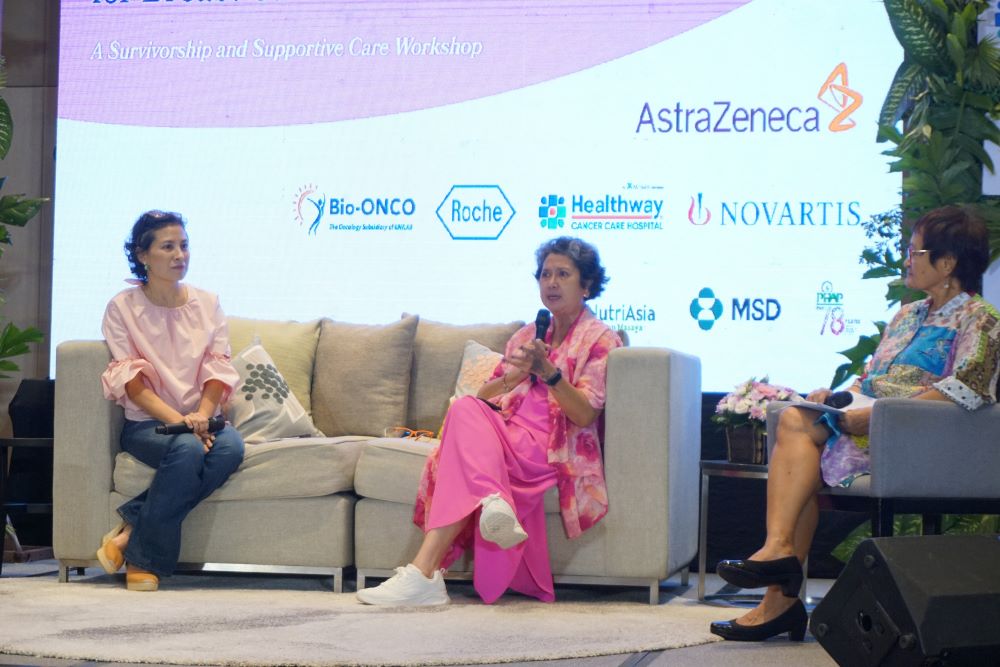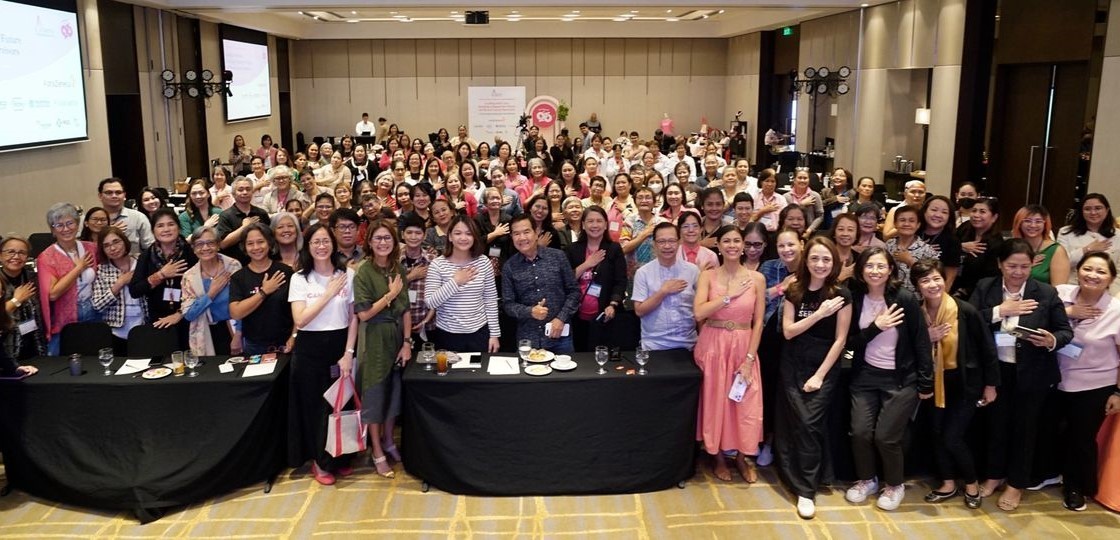ICanServe Foundation hosts breast cancer survivorship workshop to empower patients and advocates
The ICanServe Foundation (ICS) recently held a two-day breast cancer survivorship and supportive care workshop titled “Leading With Care: Building a Supportive Future for Breast Cancer Survivors” at SEDA Hotel in Bonifacio Global City (BGC), Taguig. This event, now in its fourth edition, united healthcare professionals, patient advocates, and government representatives with the goal of addressing the often-overlooked need for comprehensive long-term care for breast cancer survivors in the Philippines.
While much attention is placed on the physical challenges of battling breast cancer, this year’s workshop also placed equal emphasis on the mental health and emotional well-being of survivors, recognizing the critical role that these factors play in the overall survivorship journey.
Shifting the paradigm of breast cancer care
Kara Magsanoc-Alikpala, the founding president of ICS, opened the workshop with a powerful message about survivorship care. She emphasized that “breast cancer survivorship doesn’t end with treatment.” Alikpala also highlighted that survivorship is an ongoing journey requiring resilience and collective effort from society at large.

Kara Magsanoc-Alikpala, founding president of ICS, while delivering her opening speech
Sharing her personal experience as a cancer survivor, Alikpala recounted how a misdiagnosis almost cost her valuable time in receiving treatment. “I got sick 27 years ago, and they said it wasn’t cancer because I was still too young. Thankfully, my father insisted on a biopsy. When I sought a second opinion abroad, I discovered a crucial difference — patients there are treated as partners in their healing journey. They expect you to make informed decisions about your health. This was a revelation to me because, back home in the Philippines, patients often lack empowerment in making such choices,” she explained.
Alikpala stressed the need to bring this patient-partnership mindset to the Philippines. Through the ICS’s flagship program “Ating Dibdibin,” the foundation partners with local governments to institutionalize breast cancer care programs that span early detection, treatment, and survivorship care. This program currently works with six city partners, with outcomes indicating reduced death rates and minimal out-of-pocket expenses for patients.
However, Alikpala was quick to remind everyone that much work remains. She underscored the need for greater mobilization of resources with the same determination that the country demonstrated during the COVID-19 pandemic. “Correct information is life-saving, and we will continue to share the right information to help patients make better decisions about their care,” she said.
Still according to Alikpala, one of the most critical issues now facing breast cancer survivors is the often-underestimated power of grassroots efforts in driving significant healthcare changes. An informal ICS survey revealed that 41% of participants received critical information about government financing from support groups — surpassing even social media. “Real change often begins in small, determined communities,” she emphasized. She also noted that it is in these grassroots movements that meaningful healthcare reform can take root and flourish.
Addressing mental health in survivorship
Beyond the physical recovery from breast cancer, many survivors face significant emotional and mental health challenges. These challenges were at the forefront of discussions during the panel discussion with psychologist Lia Delgado-Infante and writer-editor Alya Honasan, a breast cancer survivor, which took center stage on the first day of the event.

L-R: Lia Delgado-Infante, Alya Honasan, and Doris Nuval during a panel discussion on mental health in survivorship
Delgado-Infante underscored the importance of addressing the fears that often accompany a cancer diagnosis. “It’s normal to feel scared when diagnosed with cancer, but you don’t have to face it alone. Prioritizing mental health is just as crucial as medical treatment,” she stated. Her message was clear: Survivors need emotional support systems that are as strong as their medical care.
Honasan echoed this sentiment, addressing the stigma surrounding mental health, particularly in the context of breast cancer survivorship.
“There’s a persistent stigma around discussing sensitive health issues — whether it’s mental health or other topics like sexual health, survivors often feel embarrassed or ashamed,” Honasan said. She urged survivors to seek emotional support, noting that mental health struggles should not be viewed as weaknesses.
“Cancer doesn’t have to lead to depression. As my psychiatrist once told me, give yourself a break. You don’t have to feel sad all the time,” she added. Both Delgado-Infante and Honasan advocated for holistic care that integrates mental health services into cancer survivorship programs.
Practical insights into treatment and monitoring
Delgado-Infante also shared her personal experience with chemotherapy, explaining that she underwent the treatment while the tumor was still present.
“Doctors were able to monitor how the tumor responded to the treatment, and if it shrank, it indicated that the cancer was sensitive to the chemotherapy drugs,” she said. This approach allowed her medical team to adjust her treatment plan as needed, providing an additional layer of precision in her care.
Honasan, on the other hand, highlighted the importance of the “Mental Health Act of 2018” (RA 11036), which guarantees the right to mental health for all Filipinos. With a limited number of mental health professionals in the country, she emphasized the crucial role of barangay health workers, mentors, and spiritual leaders in providing psychospiritual support to cancer survivors.
Tackling the issue on financial challenges
One of the other critical topics addressed during the workshop was the financial burden that often accompanies a cancer diagnosis. The session on “Financial Navigation Throughout the Cancer Journey,” moderated by Chiqui Roa-Puno, provided valuable insights into how institutions like PhilHealth can help ease the financial strain of cancer treatment.

Workshop participants led by Kara Magsanoc-Alikpala (5th from right), founding president of ICS, strike a pose after the event
Representatives from the Philippine Cancer Society and Department of Health (DOH) shared information on accessing various financial assistance programs available to cancer patients. The workshop also explored the need for policy advocacy, focusing on strengthening financial navigation services for cancer patients and ensuring that survivors receive the long-term care they need.
Participants drafted policy recommendations aimed at establishing one-stop-shop survivorship care clinics across the country and making supportive services more accessible nationwide.
In the end, the ICS workshop demonstrated that a brighter, more supportive future for breast cancer survivors is possible through collaboration. The event received significant support from key partners, including AstraZeneca, Bio-ONCO, Roche, Novartis, MSD, Healthway Cancer Care Hospital, NutriAsia, and Pharmaceutical and Healthcare Association of the Philippines (PHAP). These partnerships underscored the ongoing commitment to improving breast cancer care in the Philippines.
By fostering dialogue between healthcare professionals, patient advocates, government representatives, and survivors themselves, the ICS hopes to continue serving as a catalyst for meaningful, long-term policy changes. The goal is clear: ensuring that every breast cancer survivor in the Philippines receives the comprehensive care and support they deserve.
In the words of Kara Magsanoc-Alikpala, “The future we envision for cancer care requires a collective shift in mindset and resources. We must rally together to create a healthcare system where no one is left behind.”
ADVT.
This article is brought to you by Cervical Cancer Patients.
Read more stories here:
First in PH: Globe adopts GSMA’s Responsible AI Maturity Roadmap
Ilocos Norte launches school-based vaccination for young girls against cervical cancer
UNWND Boutique Hotel Makati hosts Miss Asia Pacific 2024 Social Night